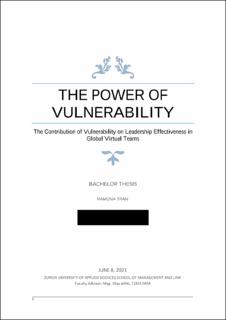Bitte benutzen Sie diese Kennung, um auf die Ressource zu verweisen:
https://doi.org/10.21256/zhaw-24571| Publikationstyp: | Thesis: Bachelor |
| Titel: | The power of vulnerability : the contribution of vulnerability on leadership effectiveness in global virtual teams |
| Autor/-in: | Tran, Ramona |
| Betreuer/-in / Gutachter/-in: | Jehle, Elias |
| DOI: | 10.21256/zhaw-24571 |
| Umfang: | 91 |
| Erscheinungsdatum: | 2021 |
| Verlag / Hrsg. Institution: | ZHAW Zürcher Hochschule für Angewandte Wissenschaften |
| Verlag / Hrsg. Institution: | Winterthur |
| Sprache: | Englisch |
| Fachgebiet (DDC): | 658.4: Leitendes Management |
| Zusammenfassung: | There is a great deal of research on leadership effectiveness. While it is argued that there is a widespread perception that vulnerability is a weakness, the literature suggests courageous leadership that harnesses the power of vulnerability to be effective. Research on vulnerability on leadership effectiveness is minimal. Therefore, this research study explores whether vulnerability shown has implications for leadership effectiveness in the context of global virtual teams (GVT). Furthermore, this paper makes contributions with implications for existing theories and practices in leadership in GVTs. To test the hypotheses of this thesis, a survey was conducted among 106 leaders and employees working in a GVT with different backgrounds and locations. Using empirically validated instruments, the questionnaire was designed to collect data on the four main research themes systematically: perceptions of vulnerability in leadership, participants’ level of demonstrated vulnerability, the level of trust and leadership effectiveness, measured by specifically defined outcomes of effective leadership and perceived leadership effectiveness (PLE) of subordinates. The research empirically validates that the two constructs of vulnerability and trust are interrelated and influence each other. It shows insights on vulnerability perceptions in GVTs and significant results in two areas: trust and leadership effectiveness in GVTs and vulnerability on leadership effectiveness in GVTs. At the theoretical level, derived from several leadership theories that include trust and similar concepts such as vulnerability as a major component of leadership effectiveness, insights were gained into the foundations on which the multidimensional construct of vulnerability as a driver of trust is built. The findings provide evidence that trust is the driving force behind the majority of the other components. This research study also confirmed that vulnerability and trust are intercorrelated. Vulnerability is furthermore perceived as having a positive influence on GVTs. The data evidenced that vulnerability, shown as a behavior, does not necessarily result in trust and vice versa. However, if so, vulnerability plays a role in building a cohesive, trusting community and therefore, can contribute to leadership effectiveness in a GVT. A decisive result is the proven importance of trust and vulnerability on the quality of communication in GVTs. A significant drawback is the lack of evidence regarding the influence on team performance in GVTs. Moreover, this study highlights the limitations of the contribution of vulnerability in GVTs, which are argued to be mainly dependent on the barrier of opening up, the degree of emotional exposure and the individual’s position within the GVT. Lastly, while vulnerability, i.e., courageous leadership, is highly welcomed in GVTs, trust is the driving force that can increase leadership effectiveness. |
| URI: | https://digitalcollection.zhaw.ch/handle/11475/24571 |
| Lizenz (gemäss Verlagsvertrag): | CC BY-NC-ND 4.0: Namensnennung - Nicht kommerziell - Keine Bearbeitungen 4.0 International |
| Departement: | School of Management and Law |
| Enthalten in den Sammlungen: | BSc International Management |
Dateien zu dieser Ressource:
| Datei | Beschreibung | Größe | Format | |
|---|---|---|---|---|
| BT - The Power of Vulnerability RT.pdf | 927.86 kB | Adobe PDF |  Öffnen/Anzeigen |
Zur Langanzeige
Tran, R. (2021). The power of vulnerability : the contribution of vulnerability on leadership effectiveness in global virtual teams [Bachelor’s thesis, ZHAW Zürcher Hochschule für Angewandte Wissenschaften]. https://doi.org/10.21256/zhaw-24571
Tran, R. (2021) The power of vulnerability : the contribution of vulnerability on leadership effectiveness in global virtual teams. Bachelor’s thesis. ZHAW Zürcher Hochschule für Angewandte Wissenschaften. Available at: https://doi.org/10.21256/zhaw-24571.
R. Tran, “The power of vulnerability : the contribution of vulnerability on leadership effectiveness in global virtual teams,” Bachelor’s thesis, ZHAW Zürcher Hochschule für Angewandte Wissenschaften, Winterthur, 2021. doi: 10.21256/zhaw-24571.
TRAN, Ramona, 2021. The power of vulnerability : the contribution of vulnerability on leadership effectiveness in global virtual teams. Bachelor’s thesis. Winterthur: ZHAW Zürcher Hochschule für Angewandte Wissenschaften
Tran, Ramona. 2021. “The Power of Vulnerability : The Contribution of Vulnerability on Leadership Effectiveness in Global Virtual Teams.” Bachelor’s thesis, Winterthur: ZHAW Zürcher Hochschule für Angewandte Wissenschaften. https://doi.org/10.21256/zhaw-24571.
Tran, Ramona. The Power of Vulnerability : The Contribution of Vulnerability on Leadership Effectiveness in Global Virtual Teams. ZHAW Zürcher Hochschule für Angewandte Wissenschaften, 2021, https://doi.org/10.21256/zhaw-24571.
Alle Ressourcen in diesem Repository sind urheberrechtlich geschützt, soweit nicht anderweitig angezeigt.